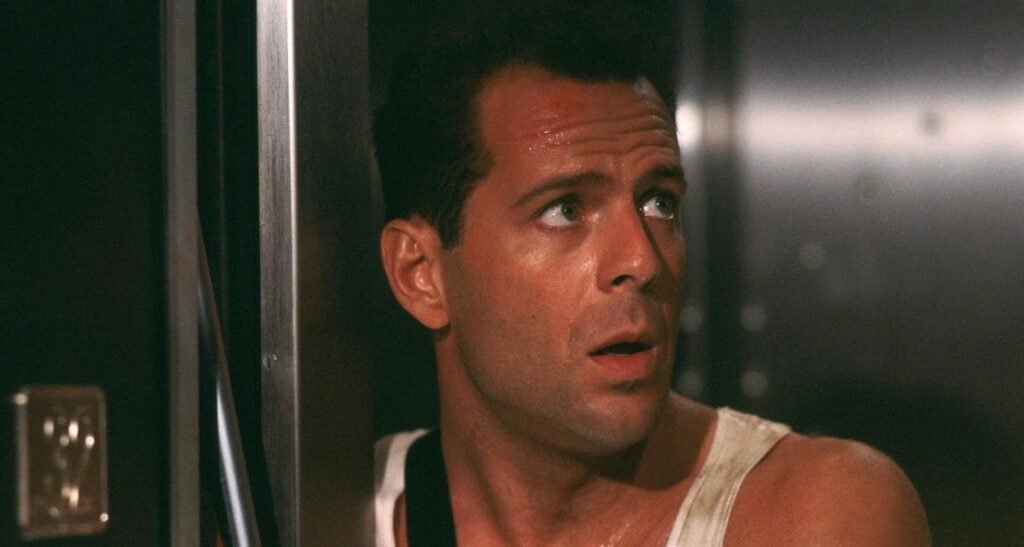Every December, a debate as reliable as holiday traffic jams re-emerges: Is Die Hard a Christmas movie?
For some, it’s a festive tradition to watch Bruce Willis crawl through air ducts while Run-D.M.C.’s “Christmas in Hollis” plays in the background.
For others, it’s an action-packed summer blockbuster that just happens to be set on Christmas Eve.
Whichever side you fall on, one thing is clear: the debate itself has become a cherished part of holiday culture.
The Birth of a Yuletide Controversy

The question “Is Die Hard a Christmas movie?” wasn’t even a thing when the film premiered in July 1988.
It exploded into pop culture consciousness in the 21st century, thanks to fan forums and social media.
Even Bruce Willis himself weighed in, emphatically stating during his Comedy Central roast: “Die Hard is not a Christmas movie; it’s a Bruce Willis movie.”
Yet, countering that, screenwriter Steven E. de Souza declared it a holiday film, likening it to It’s a Wonderful Life for its themes of redemption and family reunion.
The debate has only grown from there, fuelled by internet polls, memes, and countless “hot takes” on why Die Hard is—or isn’t—a Christmas movie.
Why Die Hard Could Be a Christmas Movie
Let’s start with the evidence for Die Hard being a Christmas movie. First, the entire plot hinges on a Christmas Eve setting.
John McClane (played by Bruce Willis) arrives in Los Angeles with a Christmas gift in hand, only to find himself embroiled in a hostage situation during his estranged wife’s office Christmas party.
This backdrop is not incidental; it’s integral. As Hans Gruber himself declares, “It’s Christmas, Theo. It’s a time for miracles.”
Then there’s the music. The soundtrack features classics like “Let It Snow,” “Winter Wonderland,” and “Christmas in Hollis.”
Even Ode to Joy—though not strictly a Christmas song—adds a sense of grandeur that’s often associated with the holiday season.

And let’s not forget the symbols: the Santa hat on a dispatched henchman accompanied by the cheeky “Now I have a machine gun. Ho ho ho.”
John McClane’s estranged wife is named Holly—a not-so-subtle nod to the season.
These are not just Easter eggs; they’re part of the film’s DNA.
The Case Against
On the flip side, critics argue that Die Hard isn’t a Christmas movie by traditional standards.
The film’s July release date, they point out, positions it as a summer blockbuster.
Unlike Home Alone or Miracle on 34th Street, its plot doesn’t revolve around Christmas themes but instead uses the holiday as a backdrop.
The story, they argue, could easily take place at any time of year—replace the Christmas party with a corporate gala, and the narrative remains intact.
Others highlight its tone. The violence, explosions, and quippy one-liners feel at odds with the heartwarming or comedic vibe of most Christmas movies.
After all, no one watches Elf expecting gunfights and glass-shard-covered feet.
What Makes a Christmas Movie?
Perhaps the more interesting question isn’t whether Die Hard is a Christmas movie but what defines a Christmas movie in the first place. Is it about the plot’s focus on holiday themes?
The presence of Christmas music and imagery? Or simply how it’s embraced by audiences during the season?
By some metrics, films like Gremlins and The Nightmare Before Christmas also blur these lines—and yet they’ve comfortably settled into the holiday canon.
For many fans, Die Hard’s appeal as a Christmas movie lies in its subversion of the genre.
It’s not about candy canes and mistletoe but grit and resilience, with just enough holiday spirit to make it seasonally appropriate.
It’s a movie where the redemption arc doesn’t come from holiday cheer but from fighting tooth and nail to reunite with family—a theme as Christmassy as they come.
A Debate Worth Having
So, is Die Hard a Christmas movie? The answer depends on your criteria.
For some, the festive setting and thematic undercurrents seal the deal.
For others, the explosions and profanity make it a hard no. But maybe the debate itself—shared over eggnog or in comment threads—is what really makes it a Christmas classic.
After all, few things bring people together like a good holiday argument.


